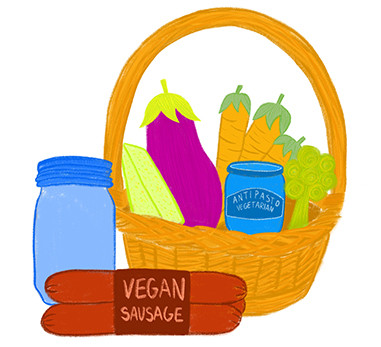Fee-levies adapt to serve community despite campus closure
Student-led groups remain committed to providing resources and opportunities
Many returning students have at one point joined a protest after chatting with folks at the Hive Café, eaten countless $0.10 samosas from Frigo Vert, or discovered their favourite local artist by listening to CJLO while preparing for finals.
All of these groups are fee-levies, student-run non-profit organizations and initiatives which students fund through a small fee.
First-year students may be wondering how they will be able to get involved. Here is what some fee-levies will be doing during the university’s closure.
Food
Many students already could not afford to eat nutritious food, but COVID-19 exacerbated the situation: 49 per cent of students found themselves without job prospects, while 48 per cent lost their job permanently or temporarily. Additionally, international students are ineligible for the Canada Emergency Student Benefit.
Multiple fee-levies, such as the Hive Café, People’s Potato, and Concordia Food Coalition, gave students access to free, healthy ingredients and meals, but due to the pandemic they had to close or drastically change the ways in which they operate.
The Hive is a solidarity cooperative located on both campuses. At Loyola they also serve a daily free lunch. This year they will not operate as an on-campus vendor but hope to serve a free lunch to students once a week.
In mid-september the People’s Potato will begin delivering items from its food bank for free and start a YouTube channel for cooking 101 lessons.
The Concordia Food Coalition is continuing to fight for sustainable food systems by moving its educational events online. They will host two week-long online workshops series, Bite Me! in September, and Transition Conference in the spring. These will discuss the theoretical fundamentals of food justice and brainstorm practical ways of fighting for it.
The intention behind Bite Me! is to “help students navigate the food system on their campus,” says Emma Campbell, CFC’s internal coordinator, while expanding the definition of campus to include Montreal as a whole.
They also partnered with two other fee-levies, Concordia Farmer’s Market and Frigo Vert, and local organizations to deliver emergency food baskets. Since the beginning of the pandemic, they have delivered over 350 baskets, which predominantly went to Concordia students. They will continue to do so as long as there will be funding.
Art and Media
There are endless ways of practicing art thanks to fee-levies, often while participating in social issues. From Art Matters to Concordia University’s Centre for Creative Reuse, students have been able to create art and be recognized for their work while preparing for an environment march or rapping for racial justice.
Concordia’s community radio station CJLO has been hosting special events online, recreating cancelled concerts, and dedicating even more time to local artists. For instance, they recently launched their Live From Home series. They have also been sponsoring local artists’ Bandcamp pages on Fridays, when the organization waives its revenue share to support the artist through the pandemic.
Francella Fiallo, CJLO manager and radio host, said they “are working to make sure students know what CJLO can provide for them,” which is not only entertainment, but also opportunities. As the semester begins, they will continue offering volunteer and paid internship positions to students, as radio hosts, techs, and more.

Before the pandemic, Concordia University Television rented equipment and lent its studios to students to help with their multimedia projects in addition to offering peer support. “We are continuing to offer support to our community by providing assistance online with pre-and-post production stages of members’ projects,” said Jenny Cunningham, CUTV communications coordinator. “We are also conceptualizing various short video contests where members can submit their work and be featured on an online platform.”
Sustainability and More
Concordia students’ commitment to environmental, economic and social sustainability is notorious. Fee-levies and student-led groups such as Divest Concordia are responsible for Concordia’s commitment to fully divest from fossil fuel companies by 2025. Additionally, they have provided students with opportunities to have a meaningful impact on society.
The Community Empowerment Education Development is mainly known for its summer internship opportunities in Uganda, but also for its events. Although internships were cancelled this summer, CEED’s team reinvented its community-building approach. It is crafting webinars on social justice and creating remote internship opportunities, bringing Canadian and Ugandan students together despite the distance. They will also offer local internships, such as a video project about Montreal’s Black grassroots organizations.
World University Service of Canada is a Canadian non-profit organization that supports youth worldwide by improving education opportunities and overcoming global inequalities. Concordia’s chapter, a fee-levy, sponsors a refugee student every year, supporting them as they explore Montreal and university life, with the aim of “making them feel at home and providing them with options,” says Alina Murad, Concordia’s WUSC President. They will do so this year as well, while also working with other organizations which aid immigrants and refugees.
The Quebec Public Interest Research Group at Concordia continues to fund its working groups, which work on grassroots social justice projects. They will still publish School Schmool, their ad-free agenda, and Convergence, their community research journal. They are also figuring out a way to deliver books from their Alternative Library to students’ homes.
The Sustainability Action Fund raises awareness and sponsors projects that develop environment-conscious infrastructures and practices. SAF has extended the list of events they support and encourages students to send more applications.
Most of their projects are online events, such as “Some of Us Did Not Die,” where Black poets performed to collect funds for Black-focused, anti-carceral initiatives, and a webinar on waste and COVID-19 co-hosted by McGill and Concordia zero-waste groups. Unfortunately, many initiatives involving hands-on work are still unaccessible, like the Pollinators Initiative and Hydroflora.
The Refugee Centre aids in the admission of refugees and asylum seekers to the university and has a mandate to support all newcomers to Concordia. The centre, which has moved its services online, offers a range of programming, including academic and legal aid. All current and future Concordia students have access to these initiatives. “We have actually seen a small spike in registrations to our services due to them being more accessible online,” said Kinan Swaid, the centre’s director of operations. The fee-levy has also seen an increase in demand for its refugee bursary fund due to the financial impact of COVID-19.
Most fee-levy groups, including those not mentioned, will be reaching out at various virtual orientation events, where they will introduce themselves and tell students about their volunteering opportunities. They will also provide information on the services they will provide to students, from funding to food. Despite restrictions, fee-levies are working to allow students to be part of a movement, grow and learn outside the classroom. As Murad says, “one thing we can do is build community.”
Editor’s Note: This article has been updated to include information on The Refugee Centre.
This article originally appeared in The Disorientation Issue, published September 8, 2020.






__600_375_90_s_c1.jpg)
_1_600_375_90_s_c1.jpg)